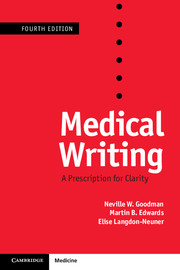Book contents
- Frontmatter
- Dedication
- Epigraph
- Contents
- Foreword
- Preface to the fourth edition
- Layout of the fourth edition
- Preface to the first edition
- Acknowledgements
- Part I Problem: the illness
- 1 Introduction
- 2 The malaise of medical manuscripts
- 3 The difficulties of English as an additional language
- Part II Solution: symptomatic relief
- Part III Practice: recuperation
- Appendix British–American English
- References and further reading
- Index
3 - The difficulties of English as an additional language
Published online by Cambridge University Press: 05 September 2014
- Frontmatter
- Dedication
- Epigraph
- Contents
- Foreword
- Preface to the fourth edition
- Layout of the fourth edition
- Preface to the first edition
- Acknowledgements
- Part I Problem: the illness
- 1 Introduction
- 2 The malaise of medical manuscripts
- 3 The difficulties of English as an additional language
- Part II Solution: symptomatic relief
- Part III Practice: recuperation
- Appendix British–American English
- References and further reading
- Index
Summary
A curious situation has arisen with the English language in medical writing and the publication of scientific research. Researchers the world over discuss science in English using their own accent and grammatical variety of the language. English is used by about twice as many people as a foreign language than as a first language. The number of people living in China alone who speak ‘China English’ will soon exceed native speakers of English in the UK and USA. What is curious, bearing in mind that correct English depends solely on usage, is that most peer-reviewed journals still require English as an additional language (EAL) authors to write not just in English but in standard British or American English. [There is no authority that regulates written English equivalent to the Spanish Real Academia Española or the French Académie française.]
Manuscripts with too many errors that give away EAL authorship are returned to authors with a requirement that the language be checked by a native English speaker. Journal editors and peer reviewers seem to read manuscripts more critically for language errors when the authors are based in a non-native English speaking country, even when their own English is faulty.
The quality of written English still needs some language corrections before being published . . . . In this sentence the cited literature is incomplete and misunderstanding . . . . It is more clearly when information will follow this Figure.
These comments from an EAL reviewer contain several errors. An English native speaker would have written something like: Some English language corrections are still needed before publication. . . . The literature cited in this sentence is incomplete and incomprehensible. . . . It would be clearer if the information were placed after this Figure.
- Type
- Chapter
- Information
- Medical WritingA Prescription for Clarity, pp. 11 - 18Publisher: Cambridge University PressPrint publication year: 2014

